last update: May 14, 2002
G'day from downunder, [...] I found your site via the "coldwar amp". What a beauty. I hope the plate pins are well insulated. By the way, you haven't put the plate-to-plate impedance of the o/p transformer, that you used, on the circuit diagram. What was it? Google, Altavista and Yahoo have no info on a "AE24332" o/p transformer. In your description you mention the fact that you could only find the 832a datasheets in French. Please find enclosed, as an attachment, the 832a datasheets from the RCA TX valve databook, in English. Unfortunately I dont have the book itself, only a dubious quality photocopy. However, the plate characteristic curves are clear and you may wish to compare/use them on your site. You may be able to find some one in America who has the actual book so you could get a better copy. Please note the power & current specs apply to the whole tube, not each half. In your description of the testing of your 832s on the AVO valve characteristic meter (beautiful machine), you mentioned the fact that, if you took them above 250v on the plates, they started to glow blue. You didn't say whether it was the dark blue high-vacuum glow on the inside of the glass or the light blue gassy glow inside the elements. As you can see from the RCA specs, the 832a should be able to handle 750v, a lot more than 250. In Australia, the 832a unfortunately has a bad reputation for going gassy relatively quickly. I think maybe yours are on the way and that's why they were cheap. We normally use 6252 or QQEO3/20 in lieu of 832a. It seems to last a lot longer, in SCR522 TXs anyway. [...] Yours Sincerely Gary Yates
I have compiled the files Gary sent into one pdf: 832A.pdf (538 kB).
The plate pins are well insulated. I could not find a suitable plate pin socket, so I took the tube to my local electronics shop. The employees looked at me as if I were from Mars (maybe I am). When I explained what it was and what I was going to do with it, their surprise turned to enthusiasm and they searched all cabinets for a matching pin socket and I got it for free! I insulated it with two layers of shrinking tube.
With regards to the OPT: Plate to plate load was 16 kOhm (I used EL84 transformers). Ra of the 832 is about 6.5 kOhms. Secundary of the transformers I used was 4 ohms, since they are driving 6 ohm speakers.
The blue glow is not gas, it's the dark blue common with high dissipation. My Fender guitar amp with its 6L6 glows about 3 times as intense, this shouldn't pose a problem (and hasn't up to now). The spec'd 750 Volts is in class-C where the tube is on for less than 50% of the time so you might want to scale that factor into the dissipation.
Remco, Well over the weekend I've heard the 832 through a Hammond 1628SE in triode single-end and using the trans screen tap. Currently I'm listening P-P through a Sansui 1000A output trans that was made for 7591s P-P. Never liked the sound of the 1628 so I didn't care for 832 SE, trioded or not. P-P is far more open and as I play a bit more sounding nice. What did you use for a plate to plate load on your Coldwar? Also what grid stoppers did you end up with? Your final amp schematic has the grid stoppers obscuring some of your data, I think "1/2 832A". I ended up with 1K wirewound grid stoppers, because I the time I was using a Hammond 125E for output and overdriving the core made my ears bleed. I will start to back down using carbon comps over the next few days, but it is sounding nice. Thanks for giving me the courage to try that tube, its so wierd from my normal tubes--subminatures--that I figured I couldn't do it. So far triode with Va/Vs=208V, fixed grid bias -10V. Knocked off a battery clip and had grid bias at -1V for a few hours, Va/Vs was 150V, didn't sound bad at all. Matt
Great to hear. The gridstoppers are relatively unimportant since the amp doesn't go into class A2. Anything from 100 ohm to 10 kOhm should work. I used 1 kOhm and couldn't find any oscillations. Important is to solder it directly to the tube socket, this way you have a very short RF pathway instead of an antenna.
Hi there, Nice page.... I happen to surf into your site & noticed "cold war". I just made a 829B PP amp using 6AN8 in front as driver. B+ is 440V and Vscreen is 220V with mosfet regulation. I have gone for the more traditional cct in the front end with the 6AN8s, I guess your choice of the 5670 maybe better as the 6AN8s that I have are very microphonic. If I would do it again, I will definely change it to a 5687 or something. I think building it on a big chassis is a good idea as the tubes are really hot. I biased all tubes at 35mA each plate , and their bias volatge is about -20V they are steady w/o any signs of oscillations. I have 4x 1K grid stoppers soldered all the way near the contacts of the septar skts. I did get a guy to machine some aluminium adaptors so that 807 plate caps would fit on those "pin ears" of these excellent tubes. They are really cheap on Ebay. I got a whole bunch , Sylvanias, GEs, Cetrons, even 3E29s too ... but I have not tried em. As U said , they power on without hum, I grounded the filaments of both the 829Bs and for the front end with 2 100R resistors centre tap to GND. All filaments are AC. It didn't like no nfb... bass was wooly , but with some feedback , its punch is clean and bass is really good becos I only used 5K5 PP load! I would have used 8K, but that's what I got lying around. the top end is really good. I think I will keep this amp a long time becos it drives my Proacs nuts.... I did wire a tuner dial lamp (bulbs that are like fuses) across the filament of the 829Bs , these give em a " big tx tube" look as a bright emitter , that's why the 829pp_3.jpg looks so bright at the bottom (no it did not catch fire). The base plate is not in place yet! I did coax about 25Vpp out @ 1khz sine into a 8R load b4 one channel started to flatten out. I was trying to cal the rms power, i was wondering if I should use (25/2)/sqrt2 or 25/sqrt2 , so using v^2/R , U either get 39watts or 9.76 watts, maybe U can shed some light on whether the Vpp need to get divided by 2 , or otherwise. i think it sounds way louder than 9.76watts. I maybe wrong. [...] Cheers Thomas Tang
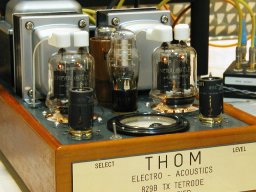
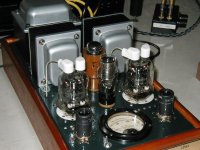
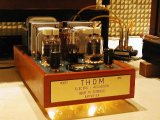
About the power measurement: You're correct in using V^2/R. The easiest way to remember the correct calculation order is: When you want to calculate rms power you want to use the rms voltage. Vpp and Vrms relate as Vpp=2*sqrt(2)*Vrms. So if you're measuring 25Vpp, that is equal to 8.8 Vrms, which equals your 9.76W into 8 ohms.
10 tubed Watts sound way louder than 10 solid state Watts. I personally think this is due to the inductive loading. During transients, the current source nature of the choke (OPT primary) allows the voltage to climb to very high values, so that your amp can develop incredibly high transient power bursts. This is why a tube amp sounds much more dynamic which in turn leads to a feeling of much more power than what is measured with sine wave tests.
About your amp: well, nothing to add to that, except for the fact that WOW! Those chassis look nice. Wish I had some more patience in that area :-(
Hi Remco, While searching info on the GU-32 I found your page. As it happens I also built an amp with this tube and used more or less the same setup. I also used a longtailed pair at the input with an active current source, but with two fets and a negative supply. I did find some info on the web about this tube. [...] The tubes I purchased came with a small paper with the specs in Russian. I had a friend translate it but it doesn't give much info. It does say that it takes the tube about 1 minute to reach stable operating conditions, ....what new,.... Apart from that, I like having found an ally because people think you're insane when you tell them you've built a good-sounding Hi-Fi amp with old Sovjet crap... Please find attached the picture that came with the tube. [...] Hi Remco, Some time ago I promised to send you some pictures when my 832 amp would be finished. Here they are! Regards, Rob.
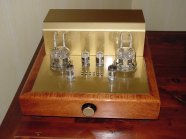
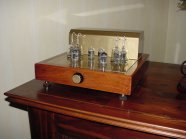
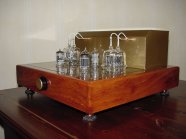
Again with the nice chassis! I think I should hire someone for that. The amp looks marvelous. I can make out a 5687 as driver. Also an excellent choice of course. I already know the 5687 from the CD enhancers and my preamp so I wanted to try another tube but this one is also one of the best! The file Rob sent is here: GU32.pdf (25 kB).
Sovjet crap? I don't think so... they made some very good stuff, especially for the army. The nuvistors I put into my riaa preamp are among the best active elements I ever heard. I'm seriously thinking of doing more with those (now don't go buying them all, and driving the prices up to levels not affordable for me!).